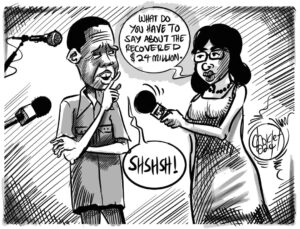Zambia is still feeling the impact of policy inconsistencies in the mining sector because the country has not yet benefitted as much as it should, says Consumer Unity Trust Society (CUTS) coordinator Chennai Mukumba.
In an interview with News Diggers! in Lusaka, Mukumba noted that the country was still reeling from the effects of an inconsistent mining fiscal regime in view of the little returns accrued from the sector.
She challenged government to find a way to make up for the losses in revenue incurred that were due to inconsistent mining policies.
“The issue of policy inconsistencies in the mining sector is something that has been of concern for us in civil society for a long time now. And the reason being, whenever you see policy inconsistency, it makes it difficult for the private sector to think in the long-term. For instance, we haven’t realised much from the mineral resources because of the inconsistencies that had engulfed that sector for a long time. To-date, we are still feeling the effects of the inconsistencies that occurred in the mining sector. So, it is prudent that government maintains, or makes the minerals taxes even better so that, Zambia, as a country, can benefit through revenue and other ways. Government should somehow make up for the loss in revenue that occurred through inconsistent policies. So, obviously that has affected even the amount of return that we could get from that sector. So, we definitely call for our government to maintain the current policies, if they want to change, they should ensure that they only make them better for the benefit of the whole Zambia. A much more consistent policy framework should be prevalent over the mining sector,” Mukumba urged.
“If you see the private sector hesitant to invest, what it means is that our returns as a country, what we are, therefore, getting from the mining sector in terms of royalties, in terms of taxes and all of that, becomes limited. So, it really doesn’t matter which sector it is because at the end of the day, even a bad policy is better as long as it is consistent. Because when you are inconsistent it then becomes much more difficult to plan. And definitely, as we plan putting in place consistent policies, we will definitely see much more output coming from that sector. I think this consistency shown by the government over the two to three years is a welcome move on the part of government.”
She added that government needed to ensure that there was a ‘trickle-down’ effect from the revenue generated from the mining sector so that all Zambians benefit.
“We want to see the benefits that are coming from the minerals sector to trickle-down to the vulnerable people in our communities so that everyone can have a fair share of the benefits from the mining sector. I think there are a number of communities that do not really benefit from the mines and, among these, are the communities in that actual mining area. They suffer the effects of mining in those areas, contaminated rivers, coloured water and many other effects. I think government should ensure that these are well-taken care of because the mining industries make a lot of money. There should be reasonable corporate social responsibility from the companies to ensure that the communities in which they mine are taken care of and benefit from the activities taking place there. If this can be done, then we can say we have begun to really benefit from the mineral resources,” said Makumba.
In January 2015, the PF-led government, under newly-elected President Edgar Lungu, had introduced a single mining tax regime with mineral royalty levels of 20 per cent for open pit mines and nine per cent for underground operations.
But the high royalty levels only lasted less than six months in 2015 as they were slashed to nine per cent for open cast mines and six per cent for underground mines by June that same year after mining entities threatened to close down their operations and went ahead to retrench thousands of workers.
By the end of 2015, close to 10,000 workers lost their jobs, mainly on account of the frequent changes in the mining fiscal regime, which mining experts cited as a key reason for the instability that rocked the sector.
Since the turbulence experienced between 2014 and 2015, Cabinet moved to approve new mining tax measures on February 17, 2016, which saw the re-designing of the tax regime for mining operations in a bid to sustain operations.
Among the key measures was the introduction of a varied mineral royalty rate for copper based on the prevailing price on the international market, commonly referred to as the ‘sliding scale’.
Frequent disasters such as mining accidents have also periodically been occurring as the search for incomes among youth rages on.












